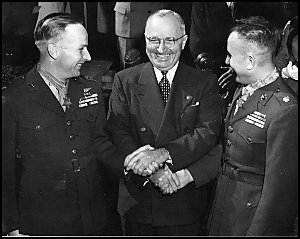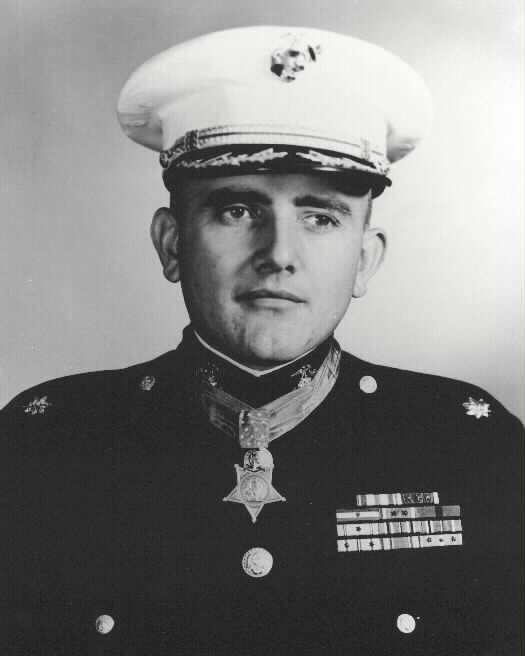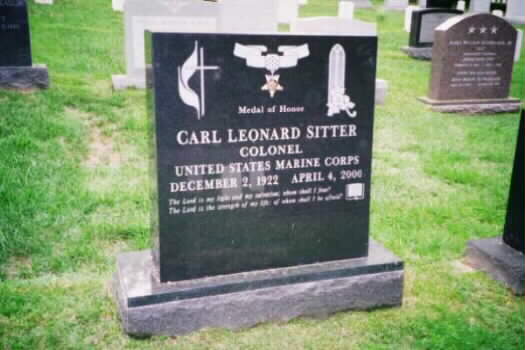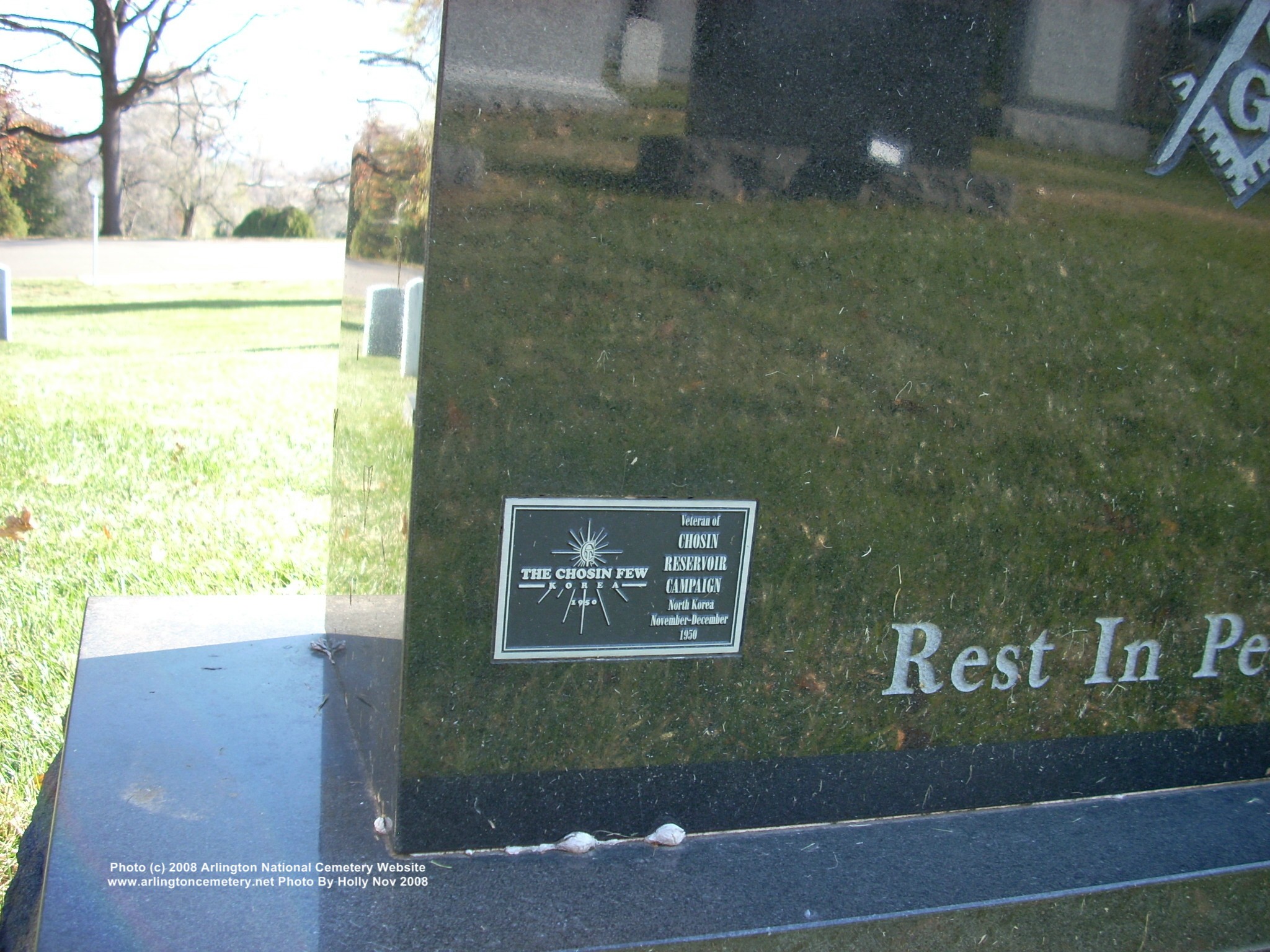Colonel Carl Leonard Sitter, who earned the Medal of Honor for valiant leadership during a two-day battle at Hagaru-ri, Korea, died 4 April 2000 in Richmond, Virginia, at the age of 77.
President Harry Truman presents the Medal of Honor to Marines Reginald Myers, left, and
Carl Sitter on October 29, 1951, for “conspicuous gallantry and intrepidity at the
risk of (their lives) above and beyond the call of duty.”
In the bitter fighting which came as the Chinese Communists were surrounding U.N. forces near the Chosin Reservoir in November 1950, Colonel Sitter, then a captain, was wounded by hand grenades but continued to lead his men until he repulsed a counterattack.
He was presented the Nations highest military decoration by President Truman during ceremonies at the White House, 29 October 1951, exactly 11 months after the acts for which he was cited.
An enlisted man for two years, Colonel Sitter was awarded a field commission during World War II. He was wounded twice in the Pacific campaigns and earned the Silver Star Medal on Guam.
Born 2 December 1922, at Syracuse, Missouri, Colonel Sitter attended public schools in Pueblo, Colorado. Upon graduating from Pueblos Central High School, he enlisted in the Marine Corps on 22 June 1940. After eight months duty in Iceland, he was ordered to the Pacific area. He was serving as a corporal in the Wallis Islands when, on 12 December 1942, he was given a field commission as a second lieutenant in the Reserve. He later received a regular commission.
Colonel Sitter saw combat at Eniwetok in the Marshall Islands, and Guam in the Marianas. He was first wounded on 20 February 1944 at Eniwetok, but went back into action almost immediately.
He was wounded again the following July on Guam, during the action in which he won the Silver Star Medal. The situation then was similar, though on a smaller scale, to the one in which he earned the Medal of Honor: he fearlessly exposed himself to enemy fire to lead his rifle platoon, and when wounded refused to be evacuated until his mission was accomplished.
Following his return to the United States, he served at San Diego; Quantico, Virginia; the Brooklyn Naval Shipyard; the Panama Canal Zone; Key West, Florida; Camp Lejeune, North Carolina; and Camp Pendleton, California. In August 1950, he joined the 1st Marine Division in Korea upon the outbreak of hostilities there.
Prior to the campaign at Hagaru-ri in which he earned the Medal of Honor and Purple Heart, Colonel Sitter participated in the Inchon landing. He remained in Korea until February 1951 then returned to the United States. While serving as an instructor at Marine Corps Schools, Quantico, he was promoted to major in May 1951 and later completed the Junior Course.
Assigned to the 2d Marine Division in June 1954, he served as a battalion executive officer and battalion commanding officer, respectively. He later served as Regimental S-3 of the divisions 6th Marines. In November 1956, he began a three-year assignment as Inspector-Instructor, 11th Infantry Battalion, USMCR, Cleveland, Ohio. He was promoted to lieutenant colonel in March 1957.
From November 1959 to May 1960, Colonel Sitter was a student at the United Kingdom Joint Services Staff College, Latimer, Buckinghamshire, England. Remaining in England, he then served for three years as Marine Representative to the Director, Naval Security Group, U.S. Naval Forces, Europe, in London. While stationed there, he completed the requirements for his BA degree at the University of Marylands European Division.
In July 1963, Colonel Sitter was transferred to the Far East, where he assumed duty as Assistant G-3, 3d Marine Division, until September 1964. While serving there, he was promoted to colonel in August 1964. Upon his return to the United States, he became Assistant Chief of Staff, G-3, Marine Corps Recruit Depot, San Diego, California, and, later, Commanding Officer, Headquarters and Service Battalion at the Recruit Depot. In September 1966, he became Chief of Staff, Marine Corps Base, Twentynine Palms, California. From November 1967 until June 1968, he served as Chief of Staff, Force Troops, FMF, Pacific. Colonel Sitter then became the Director of Installation Services, Defense General Supply Center, Richmond, Virginia. He retired from active duty, 30 June 1970.
Colonel Sitters medals and decorations include: the Medal of Honor; the Silver Star Medal; the Legion of Merit; the Purple Heart with two Gold Stars in lieu of second and third awards; two Presidential Unit Citations; two Navy Unit Commendations; the Good Conduct Medal; the American Defense Service Medal; the Asiatic-Pacific Campaign Medal with two bronze stars; the American Campaign Medal; the World War II Victory Medal; the National Defense Service Medal with one bronze star; the Korean Service Medal with four bronze stars; the United Nations Service Medal; the Chungmu Medal with silver Star from the Republic of Korea; and two Korean Presidential Unit Citations.
Carl Sitter, a Pueblo, Colorado, native who won the Medal of Honor for his service as a Marine captain in the Korean War, died of pneumonia Tuesday, April 4, 2000. He was 77.
Sitter received the Medal of Honor – the nation's highest military award – for his actions as a commanding officer during a two-day battle at Hagaru-Ki in November 1950. The fighting lasted 36 hours, and Sitter endured grenade burns to his face, arms and chest.
He refused to evacuate as the fight continued. More than half of his company was killed, wounded or captured, but a successful defense of the area was mounted by U.S. soldiers.
Sitter later was presented the Medal of Honor by President Truman and is expected to be buried at Arlington National Cemetery.
Captain Sitter was buried in Section 7-A of Arlington National Cemetery on Tuesday, 18 April 2000.
SITTER, CARL L.
Rank and organization: Captain, U.S. Marine Corps, Company G, 3d Battalion, 1st Marines, 1st Marine Division (Rein.). Place and date: Hagaru-ri, Korea, 29 and 30 November 1950. Entered service at: Pueblo, Colorado. Born: 2 December 1921, Syracuse, Missouri.
Medal of Honor Citation:
For conspicuous gallantry and intrepidity at the risk of his life above and beyond the call of duty as commanding officer of Company G, in action against enemy aggressor forces.
Ordered to break through enemy-infested territory to reinforce his battalion the morning of 29 November, Capt. Sitter continuously exposed himself to enemy fire as he led his company forward and, despite 25 percent casualties suffered m the furious action, succeeded in driving through to his objective.
Assuming the responsibility of attempting to seize and occupy a strategic area occupied by a hostile force of regiment strength deeply entrenched on a snow-covered hill commanding the entire valley southeast of the town, as well as the line of march of friendly troops withdrawing to the south, he reorganized his depleted units the following morning and boldly led them up the steep, frozen hillside under blistering fire, encouraging and redeploying his troops as casualties occurred and directing forward platoons as they continued the drive to the top of the ridge.
During the night when a vastly outnumbering enemy launched a sudden, vicious counterattack, setting the hill ablaze with mortar, machine gun, and automatic-weapons fire and taking a heavy toll in troops, Captain Sitter visited each foxhole and gun position, coolly deploying and integrating reinforcing units consisting of service personnel unfamiliar with infantry tactics into a coordinated combat team and instilling in every man the will and determination to hold his position at all costs.
With the enemy penetrating his lines in repeated counterattacks which often required hand-to-hand combat, and, on one occasion infiltrating to the command post with hand grenades, he fought gallantly with his men in repulsing and killing the fanatic attackers in each encounter.
Painfully wounded in the face, arms, and chest by bursting grenades, he staunchly refused to be evacuated and continued to fight on until a successful defense of the area was assured with a loss to the enemy of more than 50 percent dead, wounded, and captured.
His valiant leadership, superb tactics, and great personal valor throughout 36 hours of bitter combat reflect the highest credit upon Capt. Sitter and the U.S. Naval Service.
SITTER, CARL LEONARD
- COL US MARINE CORPS
- WORLD WAR II, KOREA
- DATE OF BIRTH: 12/02/1922
- DATE OF DEATH: 04/04/2000
- BURIED AT: SECTION 7A SITE 57-A
ARLINGTON NATIONAL CEMETERY
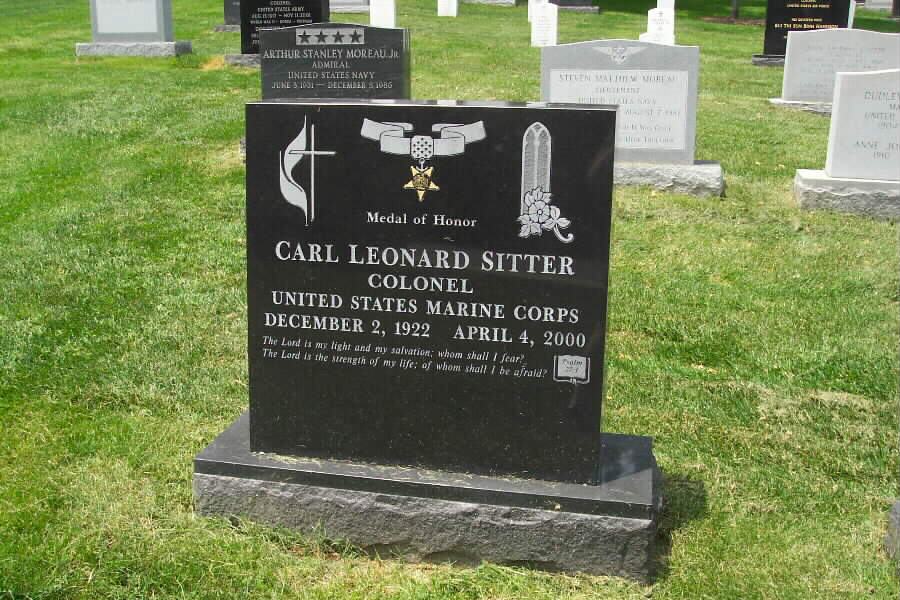
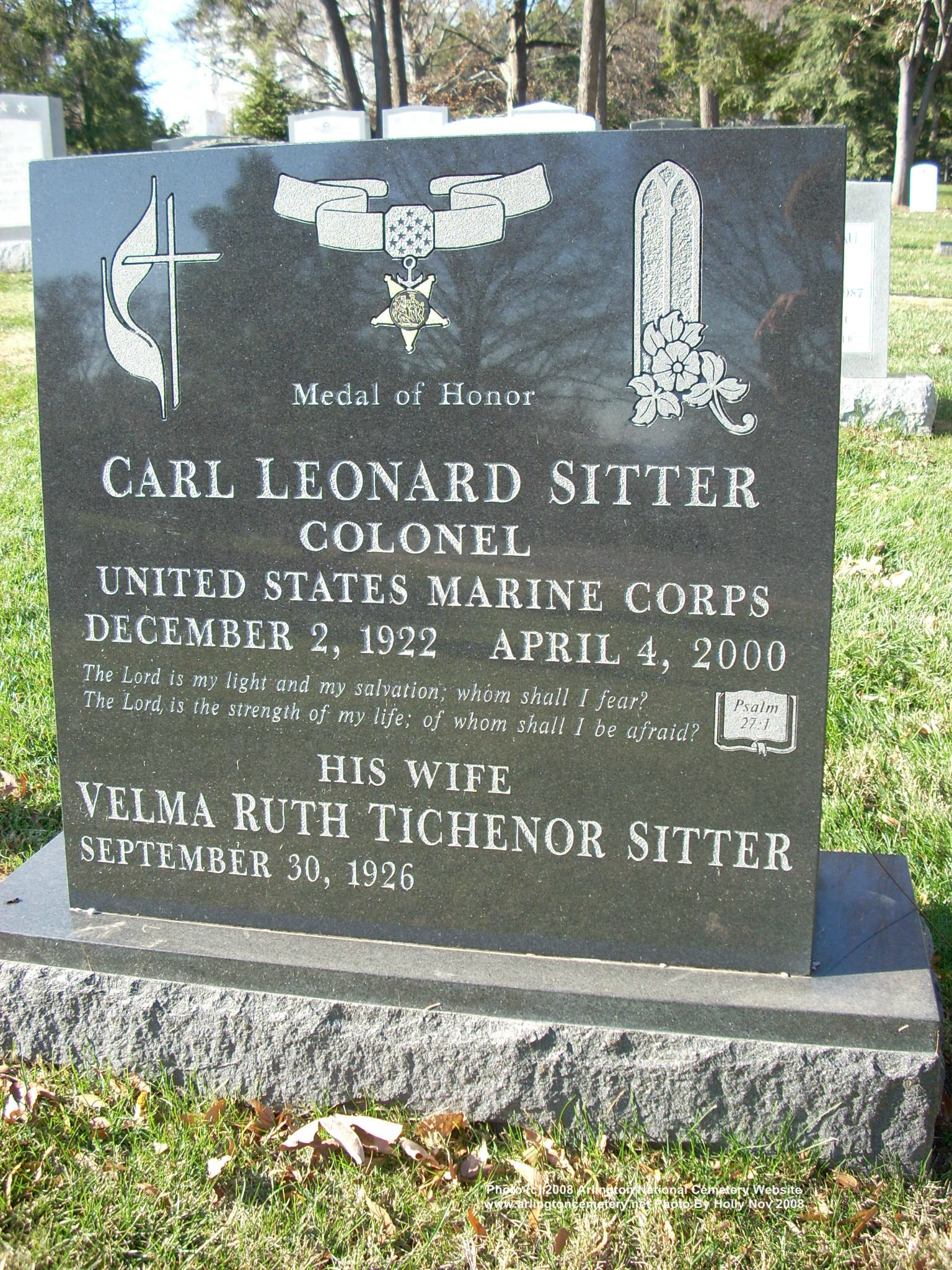
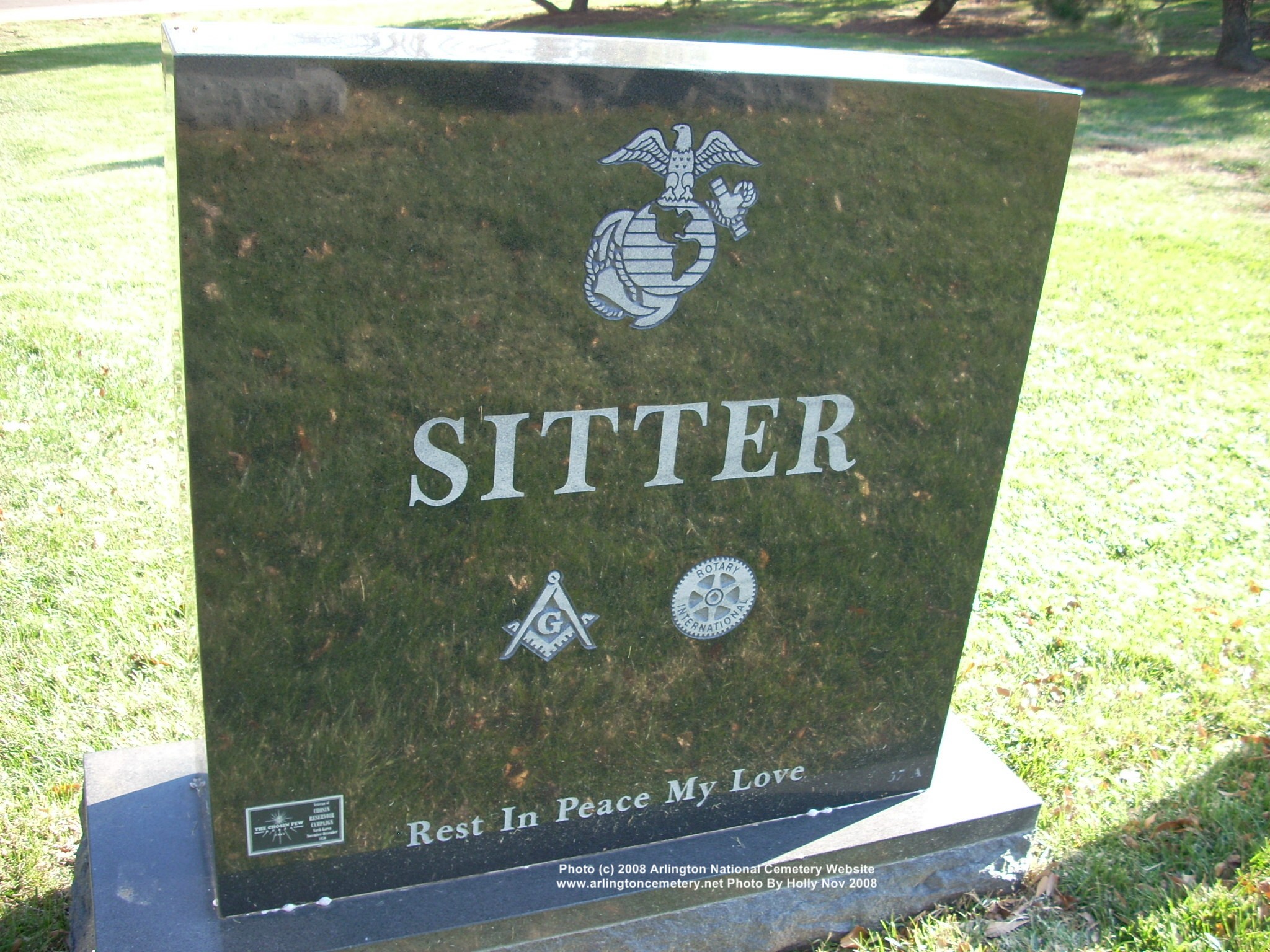
Michael Robert Patterson was born in Arlington and is the son of a former officer of the US Army. So it was no wonder that sooner or later his interests drew him to American history and especially to American military history. Many of his articles can be found on renowned portals like the New York Times, Washingtonpost or Wikipedia.
Reviewed by: Michael Howard

